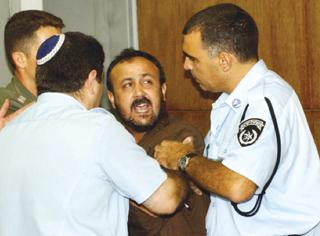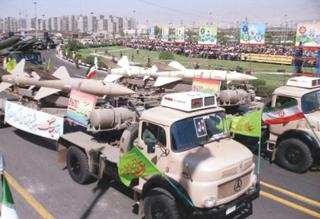 |
| Marwan Barghouti, leader of Fatah’s Tanzim in the West Bank, center, is seen in the Tel Aviv District Court on Aug.14, 2002. On this, the first day of the trial, Mr. Barghouti was charged by Israel with murder, accessory to murder, incitement to murder and membership and activity in a terrorist organization. Israeli officials claim Mr. Barghouti was the leader in organizing terrorist attacks by the Fatah militia. (Debbie Hill/UPI) |
The Israeli security establishment is examining the release of a convicted multiple murderer – Fatah leader Marwan Barghouti – as a means of strengthening Fatah chairman and Palestinian Authority (PA) President Mahmoud Abbas.
Israeli security sources confirm that the idea will be to place a strongman next to Mr. Abbas who could succeed him in future and counter the rise in Hamas’ strength.
Mr. Barghouti’s release is complicated from a legal standpoint and would require a pardon from Israeli President Shimon Peres.
The background of Mr. Barghouti’s involvement with terrorism and the incitement of terrorism is now under scrutiny in Israel.
<!–
AdSys ad not found for news/world:instory –>
On Jan. 22, 1995, after Hamas massacred 19 Israelis at a bus stop in Beit Lid – a village near the coastal city of Netanya, located within Israeli territory – Mr. Barghouti declared on the Saudi-owned MBC television network that “we cannot condemn such an attack, since this is an area that we have not yet liberated.”
Mr. Barghouti hammered out cooperative agreements in Cairo between Hamas and the PA from 1995 until his imprisonment in 2002, according to the semi-official Egyptian daily al-Ahram. He continues to do so today from prison.
According to Israeli intelligence sources and in the indictment issued against him, Mr. Barghouti, on the outbreak of the Palestinian rebellion known as the Second Intifada in 2000, became the head of a joint coordinating body of all Palestinian organizations in the West Bank – including Hamas, Islamic Jihad and the Fatah-affiliated al-Aqsa Martyrs Brigades. The American and the Israeli governments list all three as terrorist groups.
While it is widely assumed that Mr. Barghouti was only “indirectly” responsible for the murder of innocent people, he was convicted in May 2002 of first-degree murder for the cold-blooded killing of 13 innocent civilians. The Israeli Justice Ministry provided documentation that Mr. Barghouti made direct payments to commission killers to commit wanton acts of murder.
He was convicted in the murders of: Salim Barakat, 33, from the Druze village of Yarka in the Galilee, who survived by his wife, daughter, parents and seven brothers and sisters; Eli Dahan, 53, of Lod, who is survived by his mother Sarah, wife, Ilana, two daughters, two sons and three grandchildren; Yosef Habi, 52, of Herzliya, who is survived by his wife, son and daughter; Fr. Georgios Tsibouktzakis, 34, a Greek Orthodox monk from St. George’s Monastery in Wadi Kelt near Jericho; and Yoela Chen, 45, of Givat Ze’ev, who is survived by her husband and two children.
Nor are they Mr. Barghouti’s only victims. At his trial, people who were maimed as a result of Barghouti-sponsored attacks appeared as witnesses to the pain he caused them – pain they will experience for the rest of their lives.
Chicagoan Alan Bauer and his 7-year-old son, Jonathan, were among those witnesses. They were five minutes from their home in Jerusalem when a Barghouti-funded suicide bomber blew himself up three feet away from them on March 21, 2002. Two arteries in Mr. Bauer’s arm were severed. A screw went all the way through little Jonathan’s head. To this day, Jonathan walks with a limp.
According to the court protocols, Mr. Barghouti proudly admitted that he directed terrorist attacks in which scores of Israelis were killed and revealed how he directly allocated funds needed by terrorist cells to operate and purchase necessary weapons.
He stated that Yasser Arafat personally authorized this funding for Tanzim activities, knowing that this money would be used to finance murderous attacks.
Furthermore, protocols of interrogations of PA officials before the trial showed how the process worked: names of Tanzim killers were submitted to Mr. Barghouti, who would routinely take them to Mr. Arafat for approval.
David Bedein can be reached at dbedein@israelbehindthenews.com








